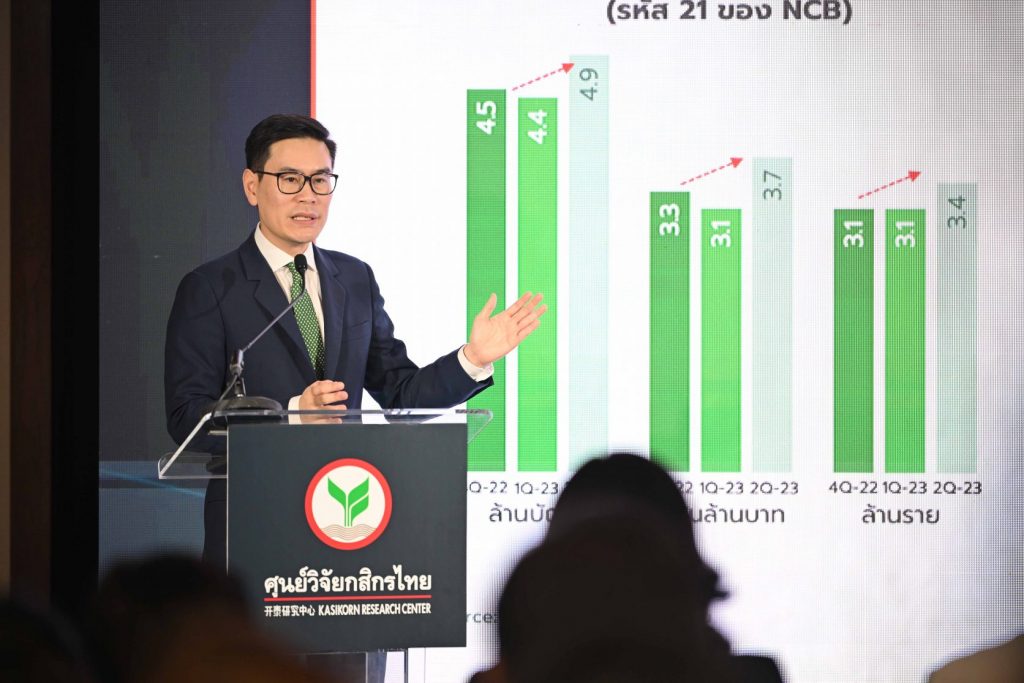ศูนย์วิจัยกสิกรไทย ปรับลดประมาณการเศรษฐกิจไทยปี 66 ลงมาอยู่ที่ 3.0% จาก 3.7% แม้ความเชื่อมั่นจะเพิ่มขึ้น หลังจากที่ประเทศไทยมีการจัดตั้งรัฐบาลสำเร็จ แต่เศรษฐกิจไทยยังได้รับผลกระทบจากการที่เศรษฐกิจโลกชะลอตัว โดยเฉพาะเศรษฐกิจจีนที่ยังคงเผชิญกับปัญหาด้านอสังหาริมทรัพย์อยู่

นายบุรินทร์ อดุลวัฒนะ กรรมการผู้จัดการ และ Chief Economist บริษัท ศูนย์วิจัยกสิกรไทย จำกัด เปิดเผยว่า เศรษฐกิจโลกยังชะลอตัวต่อเนื่อง ส่งผลกระทบกับการค้าโลก สะท้อนจากภาคการผลิตที่ชะลอตัวทั่วโลก โดยเฉพาะอย่างยิ่งเศรษฐกิจจีนและเศรษฐกิจเยอรมนีที่พึ่งพาการส่งออกสูง นอกจากนั้น จีนยังคงเผชิญกับปัญหาด้านอสังหาริมทรัพย์ ส่งผลลบกับอุปสงค์ภายในประเทศ ในขณะที่ธนาคารกลางสหรัฐฯ (เฟด) ยังแสดงความกังวลเรื่องเงินเฟ้อ อีกทั้งเศรษฐกิจที่ยังขยายตัวได้ดีอยู่ ส่งผลให้เฟดมีแนวโน้มที่จะขึ้นดอกเบี้ยต่อในปีนี้ และคงดอกเบี้ยไว้ที่ระดับสูงกว่าที่ตลาดคาดไว้ก่อนหน้านี้ในปี 2567

ทั้งนี้ เศรษฐกิจไทยมีแนวโน้มโตต่ำกว่าคาด โดยศูนย์วิจัยกสิกรไทยได้ปรับลดประมาณการเติบโตของเศรษฐกิจไทยปี 66 ลงมาอยู่ที่ 3.0% จาก 3.7% จากการที่เศรษฐกิจโลก โดยเฉพาะเศรษฐกิจจีนยังชะลอตัวต่อเนื่อง ส่งผลกระทบกับจำนวนนักท่องเที่ยวที่มองว่าจะเข้ามาเพียง 27.6 ล้านคนในปี 2566 และการส่งออกสินค้าที่จะหดตัว 2.5% มากกว่าที่เคยประเมินไว้ที่ -1% นอกจากนี้ อุปสงค์ในประเทศยังคงได้รับผลจากการที่การท่องเที่ยวยังไม่ฟื้นตัวเต็มที่ รวมถึงภาคการผลิตที่ยังชะลอต่อเนื่อง และหนี้ครัวเรือนที่อยู่ในระดับสูง โดยเฉพาะแนวโน้มการเร่งตัวของหนี้รหัส 21 หรือหนี้ที่ค้างชำระเกิน 90 วัน อันเนื่องมาจากสถานการณ์ไม่ปกติ เช่น โควิด-19 ส่งผลให้อุปสงค์ในประเทศยังอ่อนแออยู่ สะท้อนได้จากยอดขายรถยนต์ในประเทศที่ยังหดตัวต่อเนื่องและเงินเฟ้อพื้นฐานที่ปรับตัวต่ำกว่ากรอบเงินเฟ้อของ ธปท. และศูนย์วิจัยกสิกรไทยคาดว่าในการประชุม กนง. ในวันที่ 27 กันยายนนี้ ธปท.จะคงดอกเบี้ยนโยบายไว้ที่ 2.25%
สำหรับนโยบายที่รัฐบาลประกาศไปและจะดำเนินการเพิ่มเติม จะเน้นการกระตุ้นเศรษฐกิจระยะสั้น ผ่านการลดค่าครองชีพ การพักหนี้ และเงินดิจิทัล 10,000 บาท ซึ่งจะมีผลกระตุ้นเศรษฐกิจได้จำกัดในปี 2566 แต่คาดว่าจะเห็นผลบวกชัดขึ้นในช่วงต้นปี 2567 สำหรับค่าเงินบาท ศูนย์วิจัยกสิกรไทยมองว่าในระยะสั้น ค่าเงินบาทมีโอกาสอ่อนค่าจากแนวโน้มส่วนต่างดอกเบี้ยสหรัฐกับไทยที่จะอยู่ในระดับสูงอีกสักระยะ และประเทศไทยยังน่าจะรักษาอันดับความน่าเชื่อถือเอาไว้ได้ในขณะนี้ แต่ทั้งนี้ขึ้นอยู่กับการขยายตัวของเศรษฐกิจในอนาคตกับการรักษาวินัยการเงินการคลังของรัฐบาลในระยะต่อไป
ในบริบทที่การค้าโลกมีนโยบายกีดกันการค้าที่จะทวีความรุนแรงเพิ่มขึ้น ส่งผลให้เกิดการย้ายฐานการผลิตมาในภูมิภาคอาเซียนเพิ่มขึ้นด้วย แต่ที่ผ่านมาประเทศไทยยังไม่ได้รับอานิสงส์เท่าที่ควร นอกจากนั้น เศรษฐกิจไทยยังเผชิญกับความท้าทายเชิงโครงสร้างหลายอย่างที่รัฐบาลต้องให้ความสำคัญไปพร้อม ๆ กับมาตรการ Quick Win ที่กำลังดำเนินการอยู่
KResearch cuts its 2023 Thai economic projection from 3.7 to 3.0 percent
KResearch has lowered its 2023 Thai economic growth projection from 3.7 percent to 3.0 percent. Despite increased confidence after the successful government formation, the Thai economy is still grappling with the global economic slowdown, especially the weakening Chinese economy hit by property woes.
Mr. Burin Adulwattana, Managing Director and Chief Economist, KASIKORN RESEARCH CENTER Co., Ltd. (KResearch), said, “The global economy is slowing down, impacting global trade. This is evident in the global manufacturing slowdown, especially in China and Germany, which are heavily reliant on exports. China is also hindered by an ailing property sector, which has hurt domestic demand. In the US, the Federal Reserve (Fed) is concerned about inflation. The economy continues to grow, and the Fed is expected to raise interest rates further this year keeping them higher than previously forecast in 2024.”
It is expected that the Thai economy will grow slower than our prior estimate for 2023. KResearch, therefore, has cut its 2023 growth forecast for the Thai economy to 3 percent from 3.7 percent as global economic growth – particularly that of China – has seen a steady decline. Under these circumstances, the number of international tourist arrivals in Thailand are expected to reach only 27.6 million during 2023, and Thai merchandise exports may contract 2.5 percent, which would be worse than our prior estimate of (-)1 percent. Additionally, domestic demand will continue to be affected by the subdued recovery of the tourism sector, persistent slowdown in the manufacturing sector, and hefty household debt. As evidenced, NPLs classified as “Code 21”, or debt overdue by more than 90 days caused by an unusual situation such as COVID-19, are set to rise. This has caused domestic demand to remain weak, as reflected in the ongoing contraction in domestic car sales and core inflation that has fallen below the Bank of Thailand’s inflation target. KResearch expects that the Bank of Thailand will maintain its policy rate at 2.25 percent at the upcoming Monetary Policy Meeting slated for September 27, 2023.
The government’s policies that have been announced and additional priorities will focus on short-term economic stimulus measures – including reduced living costs, a debt moratorium, and the 10,000-Baht digital wallet. These initiatives will help stimulate the Thai economy to a limited extent in 2023, but their positive impacts are likely to be more pronounced at the beginning of 2024. Regarding the Thai Baht outlook, KResearch believes that the Baht is set to weaken in the short term due to the widening interest rate differential between the US and Thailand. However, Thailand is expected to maintain its credibility for the time being. Nonetheless, the Baht’s performance will depend heavily on Thailand’s future economic growth and the government’s fiscal discipline.
In the context where global trade protectionism has become more evident, there has been a rising trend of relocating production bases to the ASEAN region. However, Thailand has so far seen little benefit from this trend. Additionally, as the Thai economy is facing multiple structural challenges, the government must prioritize tackling such issues even as it implements the present “quick win” measures.



































































